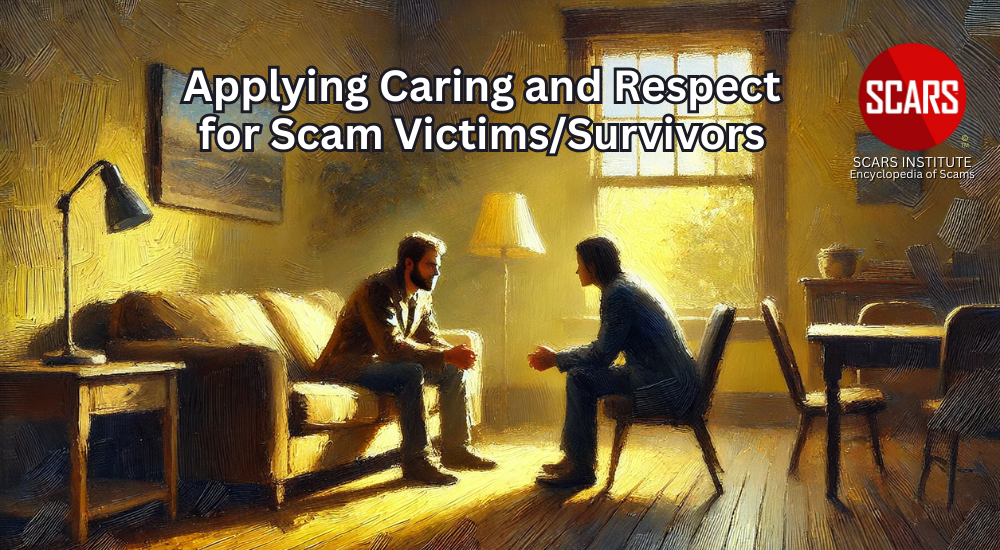
SCARS Institute’s Encyclopedia of Scams™ Published Continuously for 25 Years

RSN Editorial: Online Gambling & Scams
Recently, Former U.S. Senator Blanche Lincoln Wrote An Op-Ed Piece In The U.K. Financial Times (see below)
In considering this issue it is important to explore the psychological nature of humans and their propensity for addiction. We live in a world of easy solutions to life’s difficulties. We have instant TV, instant movies, instant communications, instant products, instant relationships, and instant gambling. All of these lend themselves to addiction!
When we apply what we have learned from supporting millions of victims of romance scams, we see a strong parallel between online gambling addiction and online romance addiction. Not only are these real addictions, but they immediately lead to scams. We know that romance scam victims (those who’s scam last for more than a couple of weeks have succumbed to an addiction – while this may be mild for some and allow for easy recovery, for others, it is permanently debilitating and life-changing (both financially and psychologically). Online gambling by its very nature is and will be far more devastating that romance scams, and what’s worse affect the same group of people who are susceptible to romance scams.
In a recent SCARS analysis of 1,720 romance scam victim profiles on Facebook, we found that 61% were also frequent players of online games (such as Farmville and countless others), all with “pay as you go” business models. In effect, this is a form of online gambling and these romance scam victims were falling for them also. We know scam victims are pre-disposed to being scammed over and over, some victims fall for more than a dozen romance scams before they finally turn away. When large-scale online gambling becomes common, then we strongly believe that this class of victims (numbering in the millions) will be instantly susceptible to becoming addicted to it as well.
Children and addicts need protection from online gambling
The DoJ should act to prevent America’s kids from visiting betting sites
BY: BLANCHE LINCOLN, Former United States Senator
The following is copyright © Financial TimesWhen 97 of my colleagues in the US Senate — both Republicans and Democrats — and I voted unanimously to pass the Unlawful Internet Gambling Enforcement Act in 2006, we reaffirmed the Department of Justice’s longstanding interpretation that the Federal Wire Act of 1961 prohibits all forms of gambling involving interstate telecommunications. The legislation gave law enforcement the tools it needed to combat online gambling at the time. But we are living in a different world today.
In 2011, a DoJ lawyer opined that the Wire Act no longer applied to all online gambling. That decision not only defied decades of legal precedent and circumvented Congress, it deprived minors and addicts of protection from the industry’s predatory practices. A single opinion emerged as the entire legal basis behind the expansion of US online gambling.
With states having been given the freedom to legalise online betting — and the recent US Supreme Court decision allowing states to offer sports betting — I am tremendously concerned about the rise of online gambling in our country.
The industry’s penchant for predatory practices is well documented in the countries that first took a chance on legalising online gambling. Last year, in the UK, The Times reported that “some of Britain’s biggest gambling operators are targeting children with their favourite cartoon and storybook characters in online betting games”. A father of a six-year-old caught the Australian bookmakers BetStars advertising to his son in a game of Angry Birds.
Given the industry’s relentless marketing schemes, it is no surprise that the UK’s gambling regulator found in 2017 that around 370,000 children and young people were gambling every week. This year, the UK Advertising Standards Authority investigated four internet gambling companies for promoting casino games including “Santa Paws” and “Fairytale Legends” that seemed likely to appeal to children.
A string of embezzlement cases in the past six months demonstrate how tight a grip the online gambling industry has over its victims. Addicts from all walks of life stole hundreds of thousands of pounds collectively from elderly parents and grandparents, a children’s charity and a nursing home.
Then there is LeoVegas, the self-proclaimed “King of Mobile Casino”, which was fined £627,000 earlier this year for sending marketing material to 1,894 people who had previously opted out. According to the UK regulator, LeoVegas did not “take all reasonable steps” to protect problem gamblers who had asked to be blocked from its websites.
The industry’s shameful strategy of tempting addicts was reflected in Ireland’s first-ever national survey of online gamblers, released in February. It found that three-quarters of online gamblers had either borrowed money or sold something in order to bet and that 64 per cent of people felt they might have a gambling problem.
While the status of online gambling has changed in the US, the industry’s tactics are as egregious as ever. Earlier this year, Internet casinos currently operating in New Jersey were caught advertising on websites specifically intended for kids and gambling addicts. In between ads for Lunchables snacks and Star Wars on Girlsgogames.com, were ads attempting to lure new players into claiming bonuses with “no deposit necessary!” Similar ads were spotted on online articles targeted at addicts with headlines such as “Twelve ways to stop gambling addiction forever.”
The FBI’s 2017 Internet Crime Report revealed that the victim count and financial losses suffered as a result of online gambling surpassed that of terrorism-related cybercrimes last year. It is this clear pattern of targeting the helpless that stands out to me. Preying on children and addicts shows how low the industry is willing to go for profit. The DoJ can prevent America’s kids from visiting online casinos open 24/7 by revisiting its 2011 opinion as soon as possible.
I urge it to do so with the urgency our most vulnerable deserve.
The writer, a former US senator from Arkansas, is founder of Lincoln Policy Group and counsel to the Coalition to Stop Internet Gambling
Link to original article: https://www.ft.com/content/cdcf64a6-a20c-11e8-b196-da9d6c239ca8?segmentId=9b41d47b-8acb-fadb-7c70-37ee589b60ab
Ironically, the gaming industry pundits have been trowing incredible hate posts up about this.
According to one site:
It’s been a while since we have been fed a solid helping of bullshit from a politician about why online gambling should be banned, so it was refreshing to read an opinion piece from former U.S. Senator Blanche Lincoln in Sunday’s Financial Times (paywall). Also refreshing was that Lincoln, who last represented Arkansas on Capitol Hill, is a Democrat, as most of the mind-numbing online poker takes have been from Republicans (though Senator Diane Feinstein says hello). While Lincoln’s screed hits on many of the usual talking points, she elevates the art form to another level in finding a way to compare online gambling to terrorism.
What seems to be lost in this discussion is the victims. Yes, some online gaming operators are legit, but we know that once the door opens the African and Russian cartels are going to rush in to capitalize on unsuspecting victims, just as they did in every other online activity.
If Society Can Barely Help Romance Scam Victims Currently, How Can We Reasonably Hope To Help Tens Of Millions More Gambling Addicts?
It is the Official Position of the Society of Citizens Against Romance Scams {SCARS] that we oppose any further legalization or relaxing of the law or regulations that limit online gambling. We encourage you to contact your U.S. Congresspeople (or International government representatives) and demand that online gambling be restricted to the maximum extent possible. In fact, you should demand tighter restrictions on the pay as you go models found in online games now since in most respects these are a form of online gambling that promotes addictive behaviors.
Frankly, there is another reason why we should not allow gambling online – JOBS! Gambling in the U.S. is a major industry, but online gambling employs algorithms not people! If people want to gamble, then go to a casino, with all of the regulations fully enforced.
We would like to hear what you think?
Cynthia Reyes,
Compliance Director
Society of Citizens Against Romance Scams Inc. [SCARS]
Miami Florida U.S.A.
– – –
WESTERN UNION REPAYMENT PROGRAM NEWS
FOR THE LATEST INFORMATION ABOUT THE WESTERN UNION REPAYMENT / REMISSION PROGRAM CLICK HERE – IT IS STILL OPEN FOR A PETITIONS FOR REPAYMENT
– – –
Tell us about your experiences with Romance Scammers in our Scams Discussion Forum on Facebook »
FAQ: How Do You Properly Report Scammers?
It is essential that law enforcement knows about scams & scammers, even though there is nothing (in most cases) that they can do.
Always report scams involving money lost or where you received money to:
- Local Police – ask them to take an “informational” police report – say you need it for your insurance
- Your National Police or FBI (www.IC3.gov)
- The Scars Worldwide Reporting Network HERE or on www.Anyscam.com
This helps your government understand the problem, and allows law enforcement to add scammers on watch lists worldwide.
Visit our NEW Main SCARS™ News & Information Facebook page for much more information about scams and online crime: www.facebook.com/SCARS.News.And.Information
To learn more about SCARS visit www.AgainstScams.org
Please be sure to report all scammers HERE or on www.Anyscam.com
All original content is Copyright © 1991 – 2018 SCARS All Rights Reserved Worldwide & Webwide – RSN/Romance Scams Now & SCARS/Society of Citizens Against Romance Scams are all trademarks of Society of Citizens Against Romance Scams Inc.
#ReportingScammers #WhereToReportScams #Anyscam #SCARS #RSN #CatchScammers #ScammerWatchLists #ArrestScammers #REPORTSCAMMERS #ANYSCAM #AVOIDSCAMS #ROMANCESCAMS #ACTAGAINSTSCAMS #NIGERIANSCAMMERS #ROMANCESCAMSNOW #SCARS #GHANASCAMMERS #FAKEPROFILES #FACEBOOKSCAMMERS #BOYCOTTAFRICANCOFFEE
-/ 30 /-
What do you think about this?
Please share your thoughts in a comment below!
Table of Contents
- Recently, Former U.S. Senator Blanche Lincoln Wrote An Op-Ed Piece In The U.K. Financial Times (see below)
- Children and addicts need protection from online gambling
- If Society Can Barely Help Romance Scam Victims Currently, How Can We Reasonably Hope To Help Tens Of Millions More Gambling Addicts?
- WESTERN UNION REPAYMENT PROGRAM NEWS
- Tell us about your experiences with Romance Scammers in our Scams Discussion Forum on Facebook »
- Please be sure to report all scammers HERE or on www.Anyscam.com
LEAVE A COMMENT?
Recent Comments
On Other Articles
- velma faile on Finally Tax Relief for American Scam Victims is on the Horizon – 2026: “I just did my taxes for 2025 my tax account said so far for romances scam we cd not take…” Feb 25, 19:50
- on Reporting Scams & Interacting With The Police – A Scam Victim’s Checklist [VIDEO]: “Yes, this is a scam. For your own sanity, just block them completely.” Feb 25, 15:37
- on Danielle Delaunay/Danielle Genevieve – Stolen Identity/Stolen Photos – Impersonation Victim UPDATED 2024: “She goes by the name of Sanrda John now” Feb 25, 10:26
- on Reporting Scams & Interacting With The Police – A Scam Victim’s Checklist [VIDEO]: “So far I have not been scam out of any money because I was aware not to give the money…” Feb 25, 07:46
- on Love Bombing And How Romance Scam Victims Are Forced To Feel: “I was love bombed to the point that I would do just about anything for the scammer(s). I was told…” Feb 11, 14:24
- on Dani Daniels (Kira Lee Orsag): Another Scammer’s Favorite: “You provide a valuable service! I wish more people knew about it!” Feb 10, 15:05
- on Danielle Delaunay/Danielle Genevieve – Stolen Identity/Stolen Photos – Impersonation Victim UPDATED 2024: “We highly recommend that you simply turn away form the scam and scammers, and focus on the development of a…” Feb 4, 19:47
- on The Art Of Deception: The Fundamental Principals Of Successful Deceptions – 2024: “I experienced many of the deceptive tactics that romance scammers use. I was told various stories of hardship and why…” Feb 4, 15:27
- on Danielle Delaunay/Danielle Genevieve – Stolen Identity/Stolen Photos – Impersonation Victim UPDATED 2024: “Yes, I’m in that exact situation also. “Danielle” has seriously scammed me for 3 years now. “She” (he) doesn’t know…” Feb 4, 14:58
- on An Essay on Justice and Money Recovery – 2026: “you are so right I accidentally clicked on online justice I signed an agreement for 12k upfront but cd only…” Feb 3, 08:16
ARTICLE META
Important Information for New Scam Victims
- Please visit www.ScamVictimsSupport.org – a SCARS Website for New Scam Victims & Sextortion Victims
- Enroll in FREE SCARS Scam Survivor’s School now at www.SCARSeducation.org
- Please visit www.ScamPsychology.org – to more fully understand the psychological concepts involved in scams and scam victim recovery
If you are looking for local trauma counselors please visit counseling.AgainstScams.org or join SCARS for our counseling/therapy benefit: membership.AgainstScams.org
If you need to speak with someone now, you can dial 988 or find phone numbers for crisis hotlines all around the world here: www.opencounseling.com/suicide-hotlines
A Note About Labeling!
We often use the term ‘scam victim’ in our articles, but this is a convenience to help those searching for information in search engines like Google. It is just a convenience and has no deeper meaning. If you have come through such an experience, YOU are a Survivor! It was not your fault. You are not alone! Axios!
A Question of Trust
At the SCARS Institute, we invite you to do your own research on the topics we speak about and publish, Our team investigates the subject being discussed, especially when it comes to understanding the scam victims-survivors experience. You can do Google searches but in many cases, you will have to wade through scientific papers and studies. However, remember that biases and perspectives matter and influence the outcome. Regardless, we encourage you to explore these topics as thoroughly as you can for your own awareness.
Statement About Victim Blaming
SCARS Institute articles examine different aspects of the scam victim experience, as well as those who may have been secondary victims. This work focuses on understanding victimization through the science of victimology, including common psychological and behavioral responses. The purpose is to help victims and survivors understand why these crimes occurred, reduce shame and self-blame, strengthen recovery programs and victim opportunities, and lower the risk of future victimization.
At times, these discussions may sound uncomfortable, overwhelming, or may be mistaken for blame. They are not. Scam victims are never blamed. Our goal is to explain the mechanisms of deception and the human responses that scammers exploit, and the processes that occur after the scam ends, so victims can better understand what happened to them and why it felt convincing at the time, and what the path looks like going forward.
Articles that address the psychology, neurology, physiology, and other characteristics of scams and the victim experience recognize that all people share cognitive and emotional traits that can be manipulated under the right conditions. These characteristics are not flaws. They are normal human functions that criminals deliberately exploit. Victims typically have little awareness of these mechanisms while a scam is unfolding and a very limited ability to control them. Awareness often comes only after the harm has occurred.
By explaining these processes, these articles help victims make sense of their experiences, understand common post-scam reactions, and identify ways to protect themselves moving forward. This knowledge supports recovery by replacing confusion and self-blame with clarity, context, and self-compassion.
Additional educational material on these topics is available at ScamPsychology.org – ScamsNOW.com and other SCARS Institute websites.
Psychology Disclaimer:
All articles about psychology and the human brain on this website are for information & education only
The information provided in this article is intended for educational and self-help purposes only and should not be construed as a substitute for professional therapy or counseling.
While any self-help techniques outlined herein may be beneficial for scam victims seeking to recover from their experience and move towards recovery, it is important to consult with a qualified mental health professional before initiating any course of action. Each individual’s experience and needs are unique, and what works for one person may not be suitable for another.
Additionally, any approach may not be appropriate for individuals with certain pre-existing mental health conditions or trauma histories. It is advisable to seek guidance from a licensed therapist or counselor who can provide personalized support, guidance, and treatment tailored to your specific needs.
If you are experiencing significant distress or emotional difficulties related to a scam or other traumatic event, please consult your doctor or mental health provider for appropriate care and support.
Also read our SCARS Institute Statement about Professional Care for Scam Victims – click here to go to our ScamsNOW.com website.

















Thank you for your comment. You may receive an email to follow up. We never share your data with marketers.